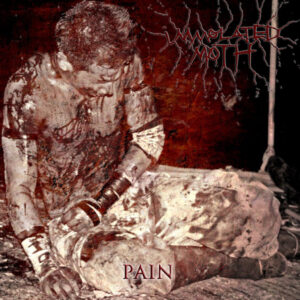Immolated Moth is a one-man project from Thom Bleasdale, an artist who looked set, at one point, to engage upon a promising career as an audio engineer. Suffering from the rare and crippling illness fibromyalgia; the symptoms of which include considerable discomfort and chronic fatigue; Thom was misdiagnosed for three years and is now a virtual shut in, unable to play live or work with other musicians. As a result it has taken two years for Thom to record ‘pain’, a raw, focused, death metal album that follows on from the well-received This Broken Mind EP and it is, in many ways, a miracle that it was recorded at all. It is a testament to Thom’s passion and dedication as a musician and the resulting album is as brutally honest as death metal gets, informed by the claustrophobic and pain-ridden life he is now forced to lead.
From the opening barrage of suffer in peace it’s clear that Thom has progressed considerably since this broken mind, both as a musician and in terms of compositional skill. A near-seven-minute grind, the ravaged guitars are underpinned by jazzy bass runs and mechanistic percussion that does little to prepare for the barely comprehensible grunts and screams that serve as vocals. Old-school death metal it is. With the noxious atmosphere of early Autopsy, the creeping atmosphere of horror seems to descend upon the listener as the track progresses and even the blistering solos can’t lift the pall of gloom. Yet, for all the rage. Thom is not interested in simply battering the listener into submission and, as the track weaves its way through the icy riffs and percussive barrages, so a more progressive aspect emerges, particularly in Thom’s frequently exceptional guitar work. It makes for a listen that is as cerebral as it is visceral and it is a dizzying start to the album. Next up, the aptly-titled anger begins, somewhat incongruously, with a funky little riff, although Thom soon smashes the shit out of it, building to an unstoppable momentum as the increasingly unhinged percussion draws from the industrial nightmare that is Godflesh. As he intones “I feel a need for destruction”, there’s a raw urgency to the claim that is given greater credence by the sonic carnage he unleashes with ever greater fervour as the track progresses. Slowing the pace to a horrifying crawl, the doom-laden insidious despicable sickness is one man’s nightmare bought strikingly to life, the scabrous vocals and nervy guitar riffs invoking a torment that most listeners will hopefully never have to face. Relentless and harrowing, insidious despicable sickness could, in the wrong hands, be almost unlistenable, but the devilish speed with which Thom dispatches the riffs serves to send the adrenalin surging through the veins as he gives vent to his frustration. In contrast, Ecocide focuses its rage outward and the result is no less devastating. Again, the listener is drawn to the richly textured basslines that lie at the heart of the track, bringing a degree of warmth and clarity that sets the music apart in spite of the scything riffs that drive the piece, only for Thom to suddenly head into territory last occupied by Paradise Lost circa Gothic.
Opening the second half of the album, the arid horror of Interrupted reality is a gruelling exercise in molasses thick riffing and guttural vocals that scrape and scar the larynx. It is deeply uncomfortable listening and it is almost a relief when a short acoustic interlude leads into the elastic groove of extinction. With vocals dragged from the darkest pit of misery, it’s still a tough listen, but the guitars have a hefty weight to them that would undoubtedly slay in the pit, if only there was a way for Thom to play live. The jazz infused outro is also exceptional and it leads the way neatly to the Khanate-worshiping horror of the bloody hunter, a track awash with a sense of unearthly dread that creeps and crawls in the darkest depths of depravity. Things don’t get any easier as the syncopated weirdness of complexity sees Thom exhorting his swollen, bleeding vocal chords to ever-more-savage feats. A track that builds to a searing grind with the relentless battering of the percussion only just audible under Thom’s increasingly unhinged grunts, complexity is well-named. The album comes to its end with heavy rain, one last bellicose assault on the eardrums that leaves the listener reeling and grateful to return to the light.
Pain is not an easy listen nor, given the circumstances of its creator, should it be. It is, however, compelling, technically dazzling and brutal as hell. There is no easy way into the album, you simply have to immerse yourself in the album, allowing the dark walls of Thom’s psyche to rise up around you. The recording, although raw, captures the depth of Thom’s instrumental ability and compositional talent with admirable clarity, the dark throbbing bass particularly crucial in underpinning the scarred beauty of the guitars. Not an easy listen then, but a deeply rewarding one, pain is a remarkable achievement from a remarkable individual. 9




